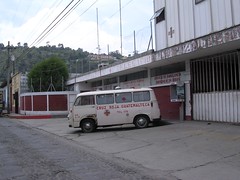In the last days we have begun a new and stimulating phase of our travel: after many days of intense searches and some disappointment, we have finally found two volunteering projects. We realize indeed the dream to share in a very intense way part of our journey with the Latin American people. Both the activities approach our interests and professions. The nomadic travel takes a pause in geographic sense, but our willing to explore and to know this complex and coloured world does not diminish, maybe enters in a still more conscious phase. In these days, under the deep contradictions of Guatemala, we often discuss on the indigenous issue, the traditions and the discriminations, the real opportunity to help these people. In Guatemala good part of the social support comes guaranteed through a net of associations, NGO and volunteers, but we discover that in this world there are many false promises. Quetzaltenango (Xela) offers a wide range of volunteering projects in the field of renewable energy: Xelateco is a young manufacturing enterprise, concerned with the fabrication of low cost environmentally sound infrastructure improvements (biodigesters, windmills, water pumps and filters, solar water heaters, micro-hydroelectric)… bienvenidos a Guatemala, the country of the “eternal spring”.
Guatemala, enfrentando su futuro
In Guatemala the social inequality catches up unthinkable levels, pushing us to a deep reflection on the situation of the Central American country. In our travel through the regions of Huehuetenango, Alta Verapaz and Quiché, in the north-western and remotest zone of the country, we noticed the situation of abandonment and indigenous social marginalization that the communities living on the mountains suffer. The scarcely productive land and the economy of subsistence continuously threaten those villages, reason for which the familiar nuclei lead a semi-nomadic life or are forced to migrate towards the coast, Chiapas or United States, when they have choice.
The community of Santa Barbara (Huehuetenango) represents a dramatic example: widely unproductive agriculture (95% of the territory is argillaceous), chronic absence of basic services (health, education), water and food refueling distant hours by walking. The situation is so difficult that it becomes evident the lack of the communitarian spirit which always characterizes the indigenous nuclei and that we have found in every village of Chiapas. Guatemala is remembering the first ten years of peace after a bloody civil war and often it is punished by natural catastrophes (lastly, the hurricane Stan), but this cannot be an excuse to perpetuate the discrimination against indigenous people. It’s sad to notice how much attention still enjoy ghosts of the past such us the former president Rios Montt, implied in the extermination of entire Mayan villages at the time of the civil war.
BEPINET project: renewables in Latin america
Some months ago the European Union activated a cooperation project with Latin America (with particular attention to Andean and Amazonian regions), which was called BEPINET Progetti in america latina (biomass energy platforms implementation for training in Latin America – network). This project aims to the development of a network of technical-scientific know-how, embedded in the rural areas of the interested countries. For domestic usage such as heating and energy production, biomass represents an alternative renewable source in competition with fossil fuels, considering the local availability of vegetal and animal waste materials.
It is not the same cooperation project as many others, where you just take the technology to be applied, but the help aims to stimulate directly the activity of universities and institutions towards a better sensibility on the energy issue and its alternative, sustainable solutions in order to give more responsibility to the local communities, creating little networks between regions. The same project was also activated in Africa.
